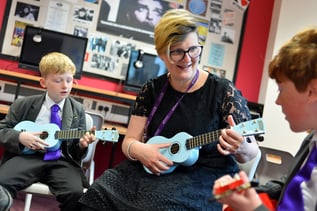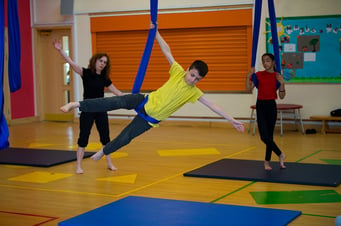
Developing Character Education through Arts Award

BY: Julie Neville
06 Jan 2020
At the start of this academic year, the Department for Education published a set of benchmarks for all schools as part of its character education framework.
Character education involves building the skills needed for resilience, empathy and employability. These can be developed through academic education as well as wider personal development, and they provide a perfect fit for Arts Award.
Earlier in 2019 the Education Secretary introduced five foundations for building character: sport, creativity, performing, volunteering and the world of work. Then in September the new Ofsted framework followed suit by recognising the importance of character education through its inclusion of personal development in the evaluation of SMSC (spiritual, moral, social and cultural development) provision. This involves aspects of culture, creativity, heritage and community participation.
The six character education benchmarks are:
- What kind of school are we?
- What are our expectations of behaviour towards each other?
- How well do our curriculum and teaching develop resilience and confidence?
- How good is our co-curriculum?
- How well do we promote the value of volunteering and service to others?
- How do we ensure that all our pupils benefit equally from what we offer?
The character education framework breaks down each benchmark using some useful self-evaluation questions. However, as an Arts Award centre you may already have several of these processes in place, especially given how closely these points map across the criteria in place at different levels of the qualification. With this in mind, we’ve set out a few ways Arts Award can support your setting to meet character education benchmarks.
Having a shared aim across the school community
Arts Award is a framework for teaching and learning that sits across the curriculum. The award can be used to structure cross curricular projects and can support engagement in non-arts subjects. For example, Arts Award at all levels can be used to deliver writing for different purposes and audiences in English. School staff who are trained as Arts Award advisers can share their aims by working in partnership with colleagues across subjects to promote and deliver Arts Award, creating a sense of pride and identity among pupils through the arts.
Promoting positive character traits among pupils
Through taking part in Arts Award, pupils have opportunities to develop character traits that can positively impact on behaviour and respect for each other. At all levels, participants are supported to become young arts leaders, sharing their knowledge, enjoyment and inspiring their peers. At Silver and Gold levels, young people create leadership projects which enable them to work as part of a team, gain understanding of leading others and consider the needs and skills of others. They will be encouraged to consider how their research has impacted their own journeys and how aspects of their character have allowed them to progress in the industry.
Developing resilience and confidence
The Arts Award Impact Study has found that Arts Award is a driver of young people’s educational and professional success. Benefits experienced by all participants included increased confidence, with outcomes including speaking in front of an audience, motivating others and applying for a place at college. 95% of advisers reported seeing a ‘great impact’ on young people’s personal confidence. Arts Award encourages the development of employability skills including resilience by encouraging participants to creatively solve problems, set themselves arts challenges and respond to unexpected situations.
 Providing a great co-curriculum
Providing a great co-curriculum
At all levels, Arts Award provides an ideal framework for extra-curricular activities that enrich the academic offer and contribute to a broad and balanced offer. Our wide-ranging view of the arts is inclusive of traditional arts activity, performing arts and creative digital media and offers opportunities for pupils to collaborate in teams as well as to progress individually. Participants can bring an existing art form interest to their Arts Award journey or try out something entirely new.
Through Arts Award your school can also promote local opportunities such as Duke of Edinburgh, National Citizen Service and uniformed youth groups – with all of which Arts Award has aligned its criteria.
Promoting volunteering and service
There are plenty of opportunities for pupils to take part in meaningful social action through volunteering and giving service to others as part of their Arts Award journey. At all levels Arts Award encourages participants to learn about their own career pathways by encouraging them to meet employers, gain experience of workplaces and take part in leadership and volunteering opportunities. All these contribute to young people becoming civic-minded and experiencing early career education.
Removing barriers to participation
By supporting a personal learning journey, Arts Award is designed to be accessible to children and young people  with a range of abilities, backgrounds and individual learning requirements. The flexible Arts Award framework can be used to overcome barriers to participation including timing, location and other practical logistics whilst its proven impact at boosting confidence and self-esteem will ensure that all participants benefit equally from taking part.
with a range of abilities, backgrounds and individual learning requirements. The flexible Arts Award framework can be used to overcome barriers to participation including timing, location and other practical logistics whilst its proven impact at boosting confidence and self-esteem will ensure that all participants benefit equally from taking part.
The Access Fund provides grants to Arts Award centres working on Arts Award projects with young people for whom access and inclusion is an issue. The grant supports centres to pilot, embed or develop their Arts Award work with these harder to reach groups.
Make sure to use our mapping resources to see how your existing character education matches the Arts Award criteria. Or book onto one of our upcoming training sessions at www.artsaward.org.uk/training.
Related posts
BY: Alan Lynch
BY: Guest Writer


.png)
%2002.jpg)
Comments & Replies